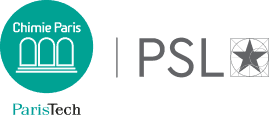Séminaire Programme Gradué Chimie PSL
VisioconférenceTeaching an old foam new tricks: material design, memories and learning in aging solids Daniel Hexner Disordered solids are often out of equilibrium, evolving slowly as they age. The small incremental changes inherent in the aging process reduce the internal stresses through microscopic plastic deformations within the material. While often considered as merely a nuisance…
Webinaire – Catalogue et Communautés : 2 outils EELISA pour renforcer votre engagement européen
A distance / En ligneLe 13 juillet 2021 de 10h à 12h, nous vous invitons à un webinaire afin de discuter autour de deux activités EELISA qui commencent à prendre forme. Lien pour rejoindre la réunion Ce webinaire abordera le catalogue de cours EELISA en construction et les communautés EELISA à créer. Vous pouvez nous faire part de vos…
Séminaire Programme Gradué Chimie PSL
"Assembling Designer Solids from Molecular Building Blocks: Principles, Prospects, and Problems", Prof. Christof WöllInstitute of Functional Interfaces (IFG), Karlsruhe Institute of Technology, North Campus, 76021 Karlsruhe, FRG. https://us02web.zoom.us/j/84719725729?pwd=UUl2bHRDcWJaQnpLNzRsS3JyeDlHQT09 Meeting ID: 847 1972 5729 Secret code: jwHG3k Plus de détails ici
Séminaire Programme Gradué Chimie PSL
VisioconférenceZero group velocity and backward elastic guided modes in homogeneous media Claire Prada and Alexandre Delory In elastic waveguides, the coupling between shear and compression waves results in complex dispersion effects. Indeed, negative phase velocity modes are observed in most waveguides like plates, tubes or ribbons. These modes, called 'backward', appear when two branches of…
Séminaire Programme Gradué Chimie PSL
Préfabriqué 1 11 rue Pierre et Marie Curie, Paris, FranceThermoluminescence, a tool to control defects in materials Bruno Viana () IRCP Chimie-Paristech, Paris, France Scientific Seminar Friday 10th of September 2:00 PM Room Prefabriqué 1 at Chimie ParisTech - PSL Thermoluminescence or thermally stimulated luminescence is a perfect tool to characterize the defects in the luminescent materials. In general, defects should…
Séminaire Programme Gradué Chimie PSL
VisioconférenceOn wrinkles, and what they have to do with liquid crystals A thin elastic sheet attached to a soft substrate often develops wrinkle patterns when subject to an external forcing or as a result of geometric incompatibility. Such patterns appear spontaneously in a variety of natural systems, ranging from plant tissues to drying paint and…
Séminaire Programme Gradué Chimie PSL
Université de Paris 45 Rue des Saints-Pères, Paris, FranceThe next CMC seminar will be held on September 17th (10.30 am) in room Génome with a presentation from Erica Benedetti (Université de Paris). The title and abstract can be found below. Presentation title: Synthesis and applications of planar chiral paracyclophanes Abstract: Originally discovered in a serendipitous fashion by vapour phase pyrolysis of p-xylene, paracyclophane (pCp) and its derivatives have rapidly gained popularity amongst…
Séminaire Programme Gradué Chimie PSL
The biophysics of plant morphogenesis Arezki Boudaoud from Ecole Polytechnique The seminar will take place in person in the Gulliver library and by zoom at the link below: What sets the size and form of organisms is still, by large, an open question. During this talk, I will aim at a broad audience…
Séminaire Programme Gradué Chimie PSL
VisioconférenceDr. Simion Beldean from Babes Bolei University (Cluj Napoca, Romania), currently present in the CBI/LSABM, will present his research work, focused on the use of GCxGC for the analysis of complex environmental samples, during a meeting that will take place on Monday 20th September, at 14h. This meeting will occur in the LSABM library (F2.09)…
Séminaire Programme Gradué Chimie PSL
VisioconférenceFrom Superfluids to Mott Insulators with Dipolar Excitons By François Dubin, INSP Paris Semiconductor excitons are composite bosons made by the Coulomb attraction between electrons and holes. Enforcing a spatial separation between these carriers provides a well oriented electric dipole to excitons, which then become model dipolar quasi-particles to explore collective quantum phenomena in the solid-state. In…


